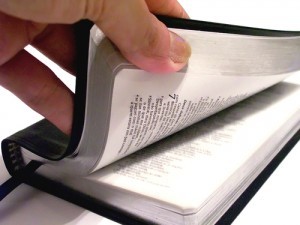 This is a guest post from Randall Burgess on how to understand Scripture in context. He uses the specific example of Matthew 6:25 where Jesus says “Do not worry.”
This is a guest post from Randall Burgess on how to understand Scripture in context. He uses the specific example of Matthew 6:25 where Jesus says “Do not worry.”
Randall works as a consultant and writer in the field of anti-counterfeiting and product security and writes regularly for the industry publication Authentication News®. He is the author of Food in God’s Place, a dialogue between a young woman and Jesus about prayer and fasting in context of discipleship.
Married for almost 24 years, he has three teenage daughters. He leads small groups and writes the blog, Food in Gods Place. You can also connect with him on Twitter.
If you would like to write a Guest Post for the Till He Comes Blog, begin by reading the Guest Blogger Guidelines.
One of the primary keys to Bible study is context.
 While it is helpful to memorize scriptural passages to discipline our mind, to have encouraging things to remember, and to have passages to meditate upon when we prepare to pray, it is also important to be aware of and understand the context from which the passage comes.
While it is helpful to memorize scriptural passages to discipline our mind, to have encouraging things to remember, and to have passages to meditate upon when we prepare to pray, it is also important to be aware of and understand the context from which the passage comes.
While there are a variety of contextual issues to keep in mind, one of the more basic types of context is the sequence of the passage we are studying. There are sometimes important sequences that we must be mindful of to avoid attempting to apply a scripture out of context and avoid spiritual frustration.
An Example: “Do Not Worry”
Many Christians love the “Do not worry” section of Matthew 6:25-33. Some read it everyday. Sadly, many do not benefit from the peace the passage offers because they fail to embrace the choices emphasized in the preceding passages.
This passage is preceded by the choice of who you will serve or where your treasure will be. That is preceded by the discussion on fasting which is preceded by prayer. In other words, the sequence of Jesus’ instruction is this:
Prayer + Fasting + Choosing God only (or embracing dependence on him) = Freedom from worry.
Without the sequence, there is no freedom from worry. Many try to not worry but still want to think about possessions, money, clothes, food, etc. The focus must be on depending on God if you want to be free from worry. It is not possible simply to “not worry.” Something (actually, Someone) must fill that place and replace the worry.



